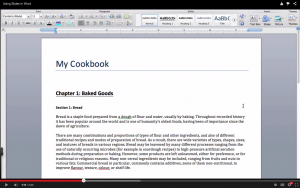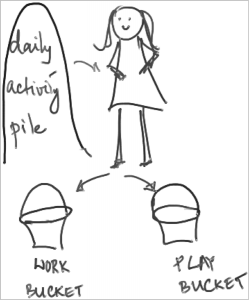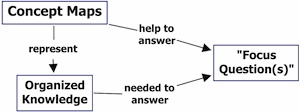 When writing a long paper, save yourself some time and help yourself stay organized by using “styles” in Word. These will help you with formatting, with navigation through your document, and with creating a table of contents! Watch this video to learn more!
When writing a long paper, save yourself some time and help yourself stay organized by using “styles” in Word. These will help you with formatting, with navigation through your document, and with creating a table of contents! Watch this video to learn more!
Category: Tips
Trying to get work done over the holiday?
 If you are spending time with family and/or friends this Thanksgiving break and brought work with you, you might need to be planful so that you get some work done and ALSO get to play and relax. It is all important. Don’t shortchange yourself in either direction. Consider what would be a reasonable amount of time to spend on your work. Schedule it in. Do it.
If you are spending time with family and/or friends this Thanksgiving break and brought work with you, you might need to be planful so that you get some work done and ALSO get to play and relax. It is all important. Don’t shortchange yourself in either direction. Consider what would be a reasonable amount of time to spend on your work. Schedule it in. Do it.
Then – enjoy your time off*!!!!
*even if there is more you could get done – you have met your schedule and play is important too.
Div II Title?
Are you finishing Div II this semester? Make sure you revise your contract. The final contract should really describe what you have done and include all the courses and practical experiences you want included.
It should also have a title that you are happy with. The title does show up on the first page of your transcript. So make sure the title helps future employers and graduate schools understand what you have studied! Talk to your committee if you want feedback on your title.
Schedule your work time.
 Many students have more to learn about structuring their time and scheduling their work. Remember, you can’t have guilt-free play time unless you figure out how to get some scheduled work done. Here are some tips:
Many students have more to learn about structuring their time and scheduling their work. Remember, you can’t have guilt-free play time unless you figure out how to get some scheduled work done. Here are some tips:
1) Make a weekly and daily schedule (actually keep a calendar) – write down the times you are in class, the times will be reading/writing, studying with a group of friends, etc. Consider the times of day you are at your best for the various tasks and write them down on your calendar!
2) Don’t be unrealistic about how long you can sit and read or write about your reading – make doable times. Add more shorter times if that works better than fewer longer times. Know yourself.
3) Hold these times sacred – turn off your phone, don’t surf the web, don’t answer friends who want to distract you. It is your time to do what you need to get done (you wouldn’t walk out on a boss, would you?). Let your friends know you are doing this so that they can be on your side instead of trying to undermine you. You might suggest they do the same thing.
4) Schedule some kind of treat for yourself if you finish your scheduled work – meet a friend for coffee or tea, go for a bike ride, take a hot shower, buy a new song. Wait until you meet your deadline to do it, though.
5) Make a to-do-list. There are some free tools for helping with this. Check out Trello. It is free and anyone can create an account. It helps you create lists and set priorities.
6) Invite friends for parallel play. Sometimes it works well to have someone else working nearby. Then you can congratulate each other when you are done!
Try a Concept Map (Mind Map) of your Div II
 Likely, there are a number of related ideas that lead you to your main questions in Div II. As you try to articulate them in a contract, it can help to map them out – to see the relationships among ideas. Concept maps help us do just that – and there are many online tools that help you create a concept map.
Likely, there are a number of related ideas that lead you to your main questions in Div II. As you try to articulate them in a contract, it can help to map them out – to see the relationships among ideas. Concept maps help us do just that – and there are many online tools that help you create a concept map.
Try to create a concept map of the major ideas that inspire you. Telling the story of the map might lead you to a clear articulation of your Concentration. You might find that there are a number of ideas that you really want to focus on and some more far flung ideas that you might explore if you have time.
Keep your portfolio as you go along
Building a portfolio helps you keep track of what you are learning, what you are strong at, and what you still need to do. It makes sense to do this as you go along rather than only putting it together at the end of Div II. At the end it is too late to realize you should have taken a methods course or worked on your analytical writing, or added a media course to help you be more creative in how you presented your theoretical learning, etc.
Start putting your important work in a binder as soon as you can – kind of like keeping an inventory of your work. Add your evals and self evals after each semester. Look over them for patterns to see what you should be working on.
And importantly, bring your portfolio to your committee chair and/or whole committee each semester to show them how you are doing. It helps them advise you when they see what you are already good at.
One other benefit of doing this is you won’t be scrambling to build your Div II portfolio when you really want to focus on the transition to Div III at the end of Div II.
What Should I do Mid-way Through?
 Some students report not being sure if they are on track in the middle of Div II — actually some aren’t even sure what the track is! It is time to think about where you came from and where you want to go. Div II is all about making sense of your disparate courses and experiences to answer your questions. It takes reflection, discussion with others (including peers and your committee) and it takes re-evaluating what you are doing and revising your plan. Here are some tips for making meaning across your experiences and setting the course for the second half of Div II.
Some students report not being sure if they are on track in the middle of Div II — actually some aren’t even sure what the track is! It is time to think about where you came from and where you want to go. Div II is all about making sense of your disparate courses and experiences to answer your questions. It takes reflection, discussion with others (including peers and your committee) and it takes re-evaluating what you are doing and revising your plan. Here are some tips for making meaning across your experiences and setting the course for the second half of Div II.
First, go back and read your contract. Remember your questions that motivated your Div II. Are your questions still the same? Have you made progress on them? Do you have new questions that are shaping your direction? Don’t wait until the end to reflect on the meaning of what you are doing. This is a perfect time to do a little free-writing. It might even become part of your retrospective. Think about and write about what has changed in your thinking. Consider the experiences that have had the greatest impact on your thinking and on your skills. Why were they so important and what does this say about your interests?
Then, go back and read all your course evaluations — one after the other, good or bad or excellent. What do they say to you about your strengths? About your areas of growth? Write down a couple of things to be working on this semester and next. Consider the resources on campus that can assist you. Have an action plan (e.g. meet with one of my professors after the first paper is handed back to talk about what they would like to see in the next one; go to the quantitative skills help sessions in Cole; meet with a friend to give each other feedback on our work and revise it before we even hand it in).
You can also pull the work together that you have done so far and organize it in a binder to begin to represent the different ideas you have been working on. Or you can start to build an electronic portfolio.
Lastly, you can edit your contract to capture the changes in your thinking. Share it with your committee and with friends.
Talking to Potential Chairs and Members
 If you are a 3rd semester student, this is an exciting time – perhaps a little daunting, perhaps not. You have been asked to list faculty who you would like to chair your Division II and been assured that you will have a Div II chair in early November. It can feel like theHub takes care of the rest. But that is only a part of the story.
If you are a 3rd semester student, this is an exciting time – perhaps a little daunting, perhaps not. You have been asked to list faculty who you would like to chair your Division II and been assured that you will have a Div II chair in early November. It can feel like theHub takes care of the rest. But that is only a part of the story.
You want faculty to know who you are and what your interests are. They will learn a little bit about you from your request form. They would learn a whole lot more if you went and spoke with them!!!
Don’t be afraid to introduce yourself to a faculty member you have not met. You can find out their office hours (they might be posted on their doors or on Hampedia, their school administrative assistant might have them, or you can email them) and make an appointment. There are also events to meet faculty. Faculty are actually expecting you!!!
